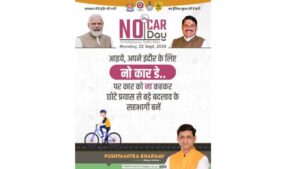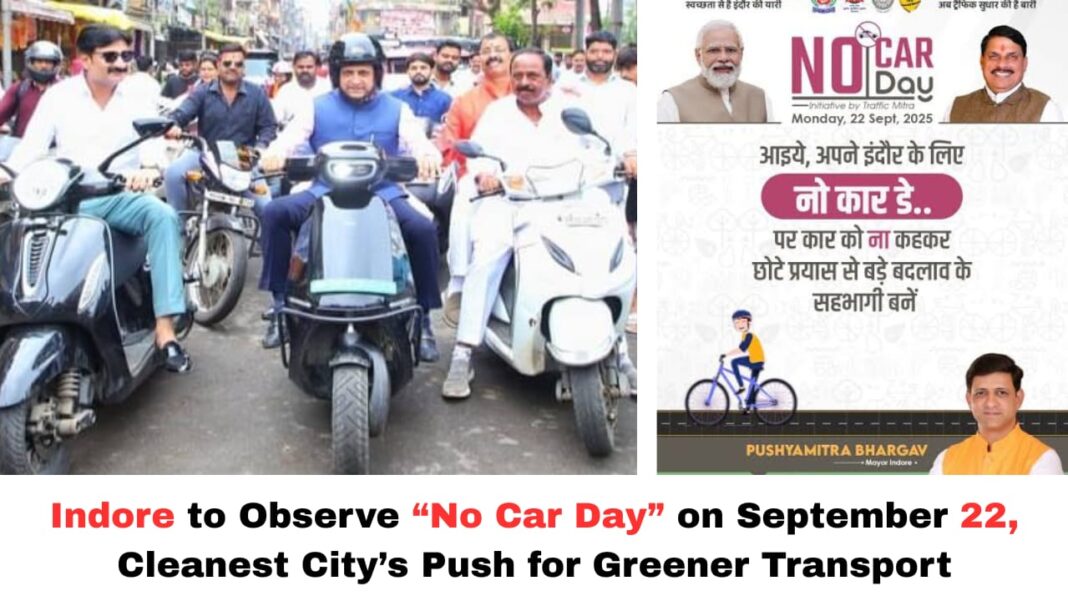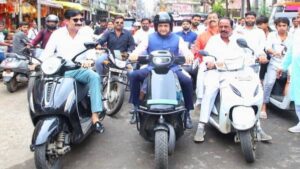Digital News Guru Madhya Pradesh Desk:
Indore’s “No Car Day”: A Bold Push for Cleaner, Smarter Mobility
On September 22, 2025, Indore will observe its third consecutive “No Car Day”, aligning with World Car-Free Day, in a bid to reduce pollution, ease traffic pressures, and promote greener alternatives for urban transport.
Often praised as India’s cleanest city, Indore is turning “No Car Day” into both a symbol and a practical effort toward sustainability. The city administration, led by Mayor Pushyamitra Bhargav, is urging citizens to voluntarily leave their cars at home for the day, and instead use walking, cycling, two-wheelers, e-rickshaws, or public transit to get around. A special car-free zone will be established from Geeta Bhawan to Palasia and back, reflecting the city’s efforts to visibly reduce vehicular traffic.

Historical Background & Past Outcomes
This isn’t the first time Indore has tried this. The city started observing No Car Day in 2023, and repeated the initiative in 2024. Over time, the initiative has shown measurable impact:
- In 2024, there was a 30 percent drop in car usage compared to the same day the previous week.
- Also that year, the city registered around 12% fewer cars on the roads for the day. The result was an estimated saving of 80,000 litres of fuel, and reductions in sulphur monoxide emissions (5.5%) and overall air pollution (about 18%).
- On traffic corridors like BRTS (Bus Rapid Transit System), car-free zones were enforced to maximize the effect.
These outcomes have added legitimacy to Indore’s approach. They show that even a single day of reduced car usage can have tangible environmental benefits—especially when supported by planning, communication, and citizen involvement.
Why Indore is Doing This
Several factors make the initiative meaningful:
- Environmental & Health Imperatives
Indore is among India’s non-attainment cities, meaning it regularly fails to meet air quality norms. Vehicle emissions, along with dust and industrial pollutants, contribute heavily to its air quality problems. Reducing vehicular traffic, especially privately owned cars, is one of the most direct ways to cut emissions. - Civic Reputation & Leadership
Indore has consistently done well in national cleanliness rankings (Swachh Survekshan, etc.). Maintaining that status means not just waste management, but tackling air, traffic and public health. No Car Day helps reinforce that image, while also showcasing municipal leadership. - Awareness and Behavioural Change
One-day events like these are as much about signaling and awareness as about immediate reductions. They invite citizens to rethink habitual car use: how often do we drive even short distances, even when alternatives exist? Over time, such days may catalyze more regular use of public transport, cycling, walking, etc. - Fuel, Traffic & Infrastructure Stress
Traffic congestion imposes economic and environmental costs: fuel wastage, lost time, wear-and-tear, and emissions. Indore’s No Car Day helps provide data points on these costs, showing how much fuel can be saved, how traffic eases, how public transit systems cope. These findings can help planners make long-term policy adjustments.
Challenges & Mixed Response
While gains are noticeable, the initiative has also encountered limitations:
- Mixed participation: Some citizens enthusiastically join in; others remain reluctant due to convenience, habits, or lack of alternatives. In 2024, the morning saw greater compliance, but traffic resumed closer to normal later in the day.
- Public transit capacity: For many, public transport, e-rickshaws, bicycles are options—but their availability, convenience, and comfort vary. If these alternatives are inconvenient, people may default to using private vehicles.
- Weather, errands, essential travel: Some car use is unavoidable, especially for those with medical needs, people living far from transit lines, or when weather is bad. One-day voluntary compliance can gloss over these real constraints.
- Sustainability beyond symbolic effect: Unless momentum sustains, impact can fade. One-off days are helpful, but cities need to follow-through: better infrastructure (bike lanes, quality public transport), regulations, incentives, etc.
What to Watch in 2025’s Edition
As Indore prepares for its third “No Car Day,” several aspects will be especially important to observe:
- Traffic and emission data: How much drop in car numbers vs previous Sundays? How much improvement in AQI (morning, midday, evening)? What are fuel savings estimates?
- Participation of government/bureaucratic leadership: As in previous years, when prominent citizens, officials, High Court judges, etc. lead by example (using two-wheelers, cycles, public transit), it sends a strong message.
- Effectiveness of car-free zones and key corridors: Zones like BRTS corridors, or major roads between Geeta Bhawan and Palasia, will be test areas. How well are they enforced? How accessible are alternatives in these zones?

- Communication and public outreach: How intensively is the campaign promoted ahead of date? Are street plays, community campaigns, social media, etc., being used? Previous years suggest that awareness boosts participation.
- Long-term policy impact: Will there be follow-ups—e.g., monthly observances, infrastructure investments, policy regulation to encourage clean mobility? Or will it stay a one-day symbolic event?
Conclusion
Indore’s “No Car Day” is more than an annual environmental event—it represents an urban experiment with tangible impacts. In the past two years, the city has recorded decreases in car-usage, fuel consumption, and air pollution, even if only temporarily. As the third edition rolls around on September 22, 2025, success will depend on participation, enforcement, infrastructure, and the resolve of both citizens and institutions to exceed the momentum of symbolic action. Whether No Car Day remains a one-off or becomes a foundational element of Indore’s sustainable mobility planning will be a test for urban India: can a clean city stay clean, and what trade-offs are we ready to make for our environment and health?
You May Also Read: Piyush Goyal to Visit Washington on Sep 22 to Push India-US Trade Deal Forward









